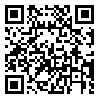Volume 2, Issue 3 (12-2018)
JCES 2018, 2(3): 16-26 |
Back to browse issues page
Department of Civil Engineering, Islamic Azad University, Tehran Center Branch, Tehran, Iran.
Abstract: (2916 Views)
Today concrete is one of the most important industrial production of human beings in the field of construction. Improving the concrete profile is always one the basic issues of the science of structural engineers are in today's world. Improve water features, It is the opinion of the researchers in this field as one of the building blocks of concrete. Magnetic water is referred to as water passing through the magnetic field its physical characteristics have changed. According to research results, increased resistance due to the use of magnetic water in concrete is 7 days resistant to 20% and in concrete for 28 days up to 14%. Using hydrostatic water is more hydrated so that the resistance increase rate with a 7-day resistance is greater than the 28-day resistance. Finally, use water the magnetic down time reduces its initial acquisition time by up to 50% of its secondary acquisition time to 19%, which reduces the time it takes the chlorine ion penetration to concrete will be minimized. As it is known, after the time of the secondary acquisition of the operating procedures concrete starts, and the less concrete time it takes, the lesser the chlorine ion will be in concrete. Research methodology as study of common mixing patterns in coastal zone concreting, laboratory results and choosing the best water mixing scheme magnet. The purpose of this the research and necessity of this study is to study the results of the research on the construction of concrete components deep in salt water (Sea) (for the purpose of implementing the harbor of the pier of Shahab port of Delvar city of Bushehr province as a case study to achieve real and objective research results.
Keywords: Magnetic water, Processing, Ion chloride, Compressive resistance, Primary and secondary hardening time, Sour water
Review Paper: Case Study |
Subject:
Special
Received: 2018/07/14 | Accepted: 2018/11/3 | Published: 2018/12/27
Received: 2018/07/14 | Accepted: 2018/11/3 | Published: 2018/12/27
| Rights and permissions | |
 |
This work is licensed under a Creative Commons Attribution-NonCommercial 4.0 International License. |




